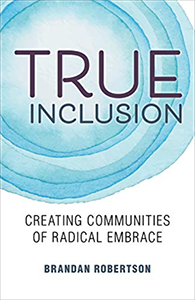How can a church community move beyond conversations and aspirations to practice true inclusion in their daily life and ministry? Brandan Robertson shares ten key strategies and principles that can help your church truly embody the gospel’s call of radical inclusivity.
Many communities and individuals desire to embrace the gospel’s call to become truly inclusive, but often that desire never materializes into anything more than conversation and aspirations. How does an individual or a community begin to practically incarnate true inclusion into their day-to-day life and ministry? These ideas can help inspire you and your community to take the first step toward incorporating true inclusion into your fundamental DNA.
1. Participate in regular community self-assessments and create an inclusion task force.
One of the most helpful and transformative process that I have ever witnessed a church undertake on their journey toward embracing radical inclusivity is to establish a team of people whose job it is to analyze the congregation’s inclusivity using raw data, anonymous interviews, and detailed analysis of the ways that systemic exclusion is at work in a congregation. This process can involve hiring an external team of diversity and inclusion experts to conduct an analysis of the church (which can be costly but is worth it!) or else using a number of assessments that have been developed by various denominations and groups. This can be a painful process. Inevitably what will be revealed are large areas where a community is not excelling in inclusion and, in fact, probably perpetuating exclusion. But as the community engages honestly in self-assessment, these revelations should not be seen as condemnations but motivations to continue to work to intentionally dismantle systems of oppression and exclusive at work in the community.
2. Give the voiceless back their voice.
One of the major failures of many progressive communities and individuals is the “overzealous ally.” So often, well-intended individuals become infuriated by injustice in the community and society and immediately begin to passionately speak up “on behalf” of marginalized communities. In some situations, speaking up on a marginalized community’s behalf is essential, especially in spaces where such communities do not have the access to power or the ability to speak. But in most situations, good allyship doesn’t mean speaking on a community’s behalf, but rather, finding ways to uplift the voices and stories of those facing exclusion or oppression. To embrace true justice, equality, and inclusion requires that those with privilege and power use that to uplift the voices of the marginalized allowing them to speak for themselves, tell their own stories, and demand their own justice.
3. Do your own research.
Communities often will turn to the marginalized in their midst and request that they educate the community about their experience and perspective. It’s important to remember that “the excluded” do not owe you or your community anything. No one is required to speak about their experience or their story. Do the research yourself. Read about the history and experience of oppressed groups, and never expect or guilt a person into educating you about their experience of exclusion and oppression.
4. Never build a platform on your advocacy for others.
Far too many communities and individual allies will seek to build a brand and platform off of their advocacy and embrace of true inclusion. But your allyship isn’t a new project or brand for you to market and benefit from, but a raw requirement of what it means to be a follower of Jesus. Seeking to build a platform on your advocacy of the rights of others is quite simply a tool that perpetuates oppression.
5. Show up to serve.
To be committed in intersectional justice requires that communities of privilege show up as servants and support movements demanding justice for marginalized people. So often we’re used to our communities and leaders being recognized and taking leadership roles in the ministries we engage in. But we must adopt the attitude that was in Christ, “who came not to be served but to serve, and to give his life a ransom for many” (Mark 10:45). If you’re not willing to put in the work to serve your neighbor of a different race, gender identity, or sexual orientation, then you are not willing to be a truly inclusive community.
6. Intentionally deconstruct patriarchy and reconstruct with inclusivity.
Take a hard look at the leadership structure in your community. Does it consist of primarily privileged and powerful classes of people? Are all sectors’ voices represented and empowered? If not, then you must intentionally begin to request that those with the most privilege and power relinquish their roles in order to uplift and provide others with positions of influence. This often feels threatening and “unfair” to those who feel that they have worked hard and earned their place in leadership. But unless the mountains are laid low and the valley exalted, unless our privilege is mailed to the cross and we embrace the servant leadership of Christ, we will never see Christ’s radical inclusion spread throughout community like we claim to desire.
7. Put your money where your activism is.
Far too many communities and individuals pay lip service to activists and their causes, but what almost every activist and organization needs is consistent financial support. If you or your church is truly concerned about activism and justice, make a commitment to a small group of organizations and activists to financially support their work and witness in the world. In this way you are extending your ministry to places that you would never otherwise be able to reach and doing it in a more effective and impactful way.
8. Repent often and publicly.
Those of us with societal privilege benefit from the oppression of the marginalized, whether or not we like it. Therefore, communities that are led and dominated by privileged voices must be quick to own their privilege and the ways that it rears its ugly head in the life of the community. Leaders must be willing to repent whenever their church, denomination, or fellow ministers of the gospel embody exclusion, and do so not only with lip service, but tangible action and effort to right the wrongs. Only when a sincere spirit of humility and repentance is embodied will trust be established that paves the way for true justice and inclusion.
9. Don’t be a community of “response” but of consistent advocacy.
It is popular among progressive communities of faith to respond to current events and cultural moments. While the sentiment is right — our communities should certainly be speaking boldly against injustice in our culture and society — this shouldn’t be something that we do in response to tragedies or horrendous situations, but on a regular basis. Our communities should always be proactive in our identification of injustice and outlining constructive paths for the establishment of justice and equity. Our advocacy should be 365 days a year not just when some event catches the attention of the national media.
10. Engage in regular community-wide studies, trainings, and discussions.
Dozens of organizations in your community offer trainings, studies, and discussion on the justice matters that affect those who live around you. Be intentional about building relationships with these local justice organizations, engaging with the leaders, sending volunteers to serve, and using the wealth of resources that are likely available to you to educate, equip, and empower your community to live into Christ’s call to be truly inclusive in every year.
These are just ten potential actions steps your community can take to begin embracing true inclusion. All these steps require humility, dedication, and sacrifice — the very basic requirements of true discipleships — but in my experience, the communities that begin to embrace true inclusion in these sorts of tangible, quantifiable ways all become powerful forces for healing and justice in their communities and beyond.
 This material is adapted from True Inclusion: Creating Communities of Radical Embrace (Chalice Press, 2018) by Brandan Robertson. Used by permission. The book is available at Chalice Press, Cokesbury, and Amazon.
This material is adapted from True Inclusion: Creating Communities of Radical Embrace (Chalice Press, 2018) by Brandan Robertson. Used by permission. The book is available at Chalice Press, Cokesbury, and Amazon.
Related Resources
- 7 Key Characteristics of Diversity-Oriented Churches by Brian Leander
- Centering Marginalized Voices to Lead Change featuring Tyler Sit — Leading Ideas Talks podcast episode | Podcast video | In-depth interview
- Diverse Congregations Are Stronger Congregations by Faith Communities Today
Cover image by rawpixel.com on Freepik







